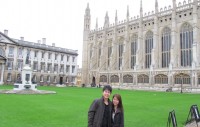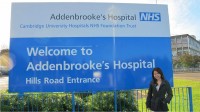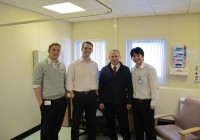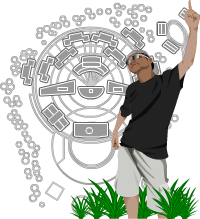FINAL YEAR ELECTIVE POSTING IN UNITED KINGDOM
By Alex Lau Lian Quan and Leong Ai Leng (MBBS Batch 10)
The elective posting is part of the MBBS programme which is held at the end of the first term for all the final year students. It is basically a 6 weeks posting and the students are free to apply to any of the hospitals all over the world. This elective is an opportunity to experience medicine in an entirely different setting compared to the hospital that we are currently training at and also to broaden our medical knowledge and explore possible interest in the future. Personally, I view this elective as a chance to experience how medical education is conducted and how things work in a developed country. As such, I narrowed down my options to the United Kingdom. The elective posting was set to start from 25th October 2010 to 3rd December 2010. I have chosen to apply to University of Glasgow while Ai Leng, my another course mate who also went to the United Kingdom, applied to University of Cambridge as both of these universities are wellknown for delivering quality education. We were both very fortunate to be accepted and we could not contain our excitement. I have chosen to go for Orthopaedics posting while Ai Leng went to the Anaesthetics Department.
On 22 October 2010, we flew to London before I took another flight to Glasgow while Ai Leng took a bus to Cambridge. It was freezing over there with a mere 5 degree Celcius when we
touched down in Heathrow Airport. We made use of the opportunity to do some sightseeing before leaving for our respective universities.
In Glasgow, I settled down in the student village which has been arranged by the university prior to my arrival. Owing to the geographical location where it is situated at the northern part, Glasgow was a lot colder than London. I had to travel to the hospital everyday by tube or buses as the student village was quite a distance from the Southern General Hospital, the
place where I was posted. Ai Leng was more fortunate as she was offered the accommodation in the Addenbrooke’s hospital site in Cambridge.
In the Southern General Hospital, I was truly amazed by how things were being done as it was quite different from Malaysia. For instance, while seeing patients in the clinic, the Consultant no longer write or type anything but he would just record his findings and plan of management with a voice recorder and it would then be typed by another clerk. Besides that, although I was just an elective student, I was treated equally like the medical students there and the Consultants also willingly taught me all the new things which I had not learnt before. I also had the chance to scrub in for many different operations such as total hip, knee, shoulder and elbow replacement, shoulder and wrist arthroscopy (I could never imagine how it was being done before I saw it), correction of deformity and fixation of fractures. At the same time, I also managed to see so many cases that I have never seen before in Malaysia such as Dupuytren’s contracture (abundant there), impingement syndrome, Madelung’s deformity, typical rheumatoid hands, Perthes disease, psoriatic arthropathy, all the different types of nerve entrapment syndromes and many more. It was definitely easier to remember what you have read when you see them for yourself as the image would remain etched in your mind. Furthermore, I was really astounded when the Registrar asked me to conduct the follow up clinic where I examined and counseled the patients on my own before presenting the cases to him. I felt really honoured to be given such opportunity.
During my posting, there was also an incidence which served as a very important lesson for me. During one of the operations where I scrubbed in to assist my supervisor, Mr. Bransby Zachary, in the reverse polarity shoulder replacement, I saw a small chip of metal dropping into the shoulder but my consultant and his registrar did not notice it. I was contemplating as to whether I should tell them or not because I was worried that it might be disrespectful. Besides that, it might also create an unnecessary problem should I have seen it wrongly. However, I finally decided to tell them for the sake of the patient and they were very shocked. They immediately did some suction to have a clear view of the joint and there it was, lying in below thetissues was a small metal chip. From this incidence, I learnt that we should be more confident and to not be fearful in raising our opinions even to someone who is much more superior. Just imagine if that chip of metal remained inside the joint, the patient would most likely be subjected to another round of operation which would have been deemed unnecessary at the first place.
As for Ai Leng, being in the Anaesthetic Department, she had the opportunity to witness many operations and to carry out procedures such as intubations, bag and mask ventilation, spinal anaesthesia and so on. Besides that, she also observed some operations which are not done in Malaysia such as Robotic Prostatectomy. For this operation, the surgeon actually maneuvered the robot from one corner of the room while other assistants would be holding the trocar for him. The most amazing thing was when the surgeon actually sutured using the hands of the robot. According to her, things are done very systematically in Cambridge as the students there received their rota via email before the start of the week so that they will know which consultant they will be following and the theatre that they will be going to. The doctor to student ratio is just 1:1 because in the department, there are as many as 50 Consultants and 50 Registrars and this is probably the reason why such practice is feasible. Moreover, she also joined the Cambridge students for their tutorial where they had discussions about different topics related to Anaesthesia. During her posting, she also had an unforgettable experience where a surgeon accidentally dislodged the endotracheal tube in a 5-month-old patient towards the end of the surgery. It was indeed an emergency as the child was desaturating rapidly from 98% to 68%. She was the only one there with the anaesthetist as the assistant was away to get some drugs. The main problem was that the anaesthetist was unable to re-intubate the patient and there was difficulty in ventilation as the mask was not long enough since the patient’s head was placed at the opposite direction for the convenience of the surgeon in doing the cleft palate repair. She immediately helped to turn the oxygen to the maximum and switched off the inhalational agents. It was fortunate that the baby was safe in the end. From this incidence, she learnt the importance of being vigilant at all times as mishaps can take place anytime without you expecting.
During our 6 weeks posting there, both of us realized that the doctor-patient relationship is highly emphasized there. The doctor took a lot of time to explain the condition to the patients to ensure that they fully understand what they were having and their plans of management. As such, do not be surprised when patients come and tell you things like he or she has paroxysmal atrial fibrillation and is on fleicanide. After all, this is what one of the patients told Ai Leng when she was doing pre-anesthetic assessment with the doctor.
Besides spending most of our times in the hospital, we also took the opportunity to travel around some places such as London, Edinburgh, France and Italy. Travelling around and seeing those world-class art and historical buildings truly made our journey all the more enjoyable.
Through this elective posting, we feel that we have not only learnt a lot about medicine, but also a lot about ourselves. We have experienced not only a different health care system but also a different culture and way of life. This has definitely broadened our horizons and made us more knowledgeable about the world. Through the practical and theoretical experience we gained during our medical electives, we become more confident and hope to emulate all the good points which we have learnt. All in all, we will most definitely remember this elective as a valuable learning experience and grateful that we had such a positive experience in our final days as medical students.
Source: AIMST University Faculty of Medicine Newsletter Volume 2 (August 2010 – Febuary 2011)




